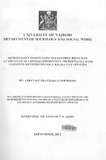| dc.description.abstract | This project paper articulates the accomplishments and challenges of UOB Microfinance Institution in its mission to reduce poverty in Rwanda. It attempts to evaluate theories and practices that guide MFIs in dealing with poverty issues among the clients. It aims at making a critical analysis leading to practical recommendations and strategies that can improve the work of Microfinance Institutions to reduce poverty with more outstanding impact among their recipients.
The first section covers the contextual background of MFI in Rwanda. Indeed, Microfinance Institutions in Rwanda are still operating in their development stage, strategizing for better packaging their products and services to the clients, mostly self employed, low income earners, and poorly trained'recipients. The many MFIs (43 out of 230) that failed to deliver promised services to the poor forced the government of Rwanda to intervene with more strict rules and regulations to kick out non performing and minimize future repeat of the same mistakes.
The second and third sections review existing publications to gather relevant information for this research and establish possible gaps that the study could claim to fill in. The general discovery is that no much research has yet been done in this field in the country, but self generated reports from stakeholders do exist both from MFI, the government, and other international agencies. Various theories of poverty have been reviewed to identify and make good use of those that explain better the situation of poverty in Rwanda. The end result has been a conceptual framework that schematically links the government, MFIs, business entities, and poor households for the work of reducing poverty by micro credit scheme. An appropriate methodology to collect, analyse, and present data has been developed in terms of questionnaires.
The substantive section of the project dedicates itself to the field survey data presentation and analysis. The empirical data collected among the clients in Kicukiro district constitute the basis for the study findings, conclusions, and recommendations. They are presented in tables that generate totals, percentages, and graphs to facilitate the analysis. They reveal the level of success and challenges of MFIs towards poverty reduction, perceptions associated with them by clients, and suggest strategies that may help to reduce poverty with more life changing impact.
Upon testing the two hypotheses formulated to enhance this research analysis, it appears that UOB makes a positive impact in reducing poverty among its borrowers. A detailed analysis of respondents provided data ascertains that increased income, access to basic needs, acquisition of assets, and improved participation in public life has been felt among 98 % of the respondents.
This life change improvement is evidenced by a regular monthly income of more than 100
/
American dollars per participant that enable them to provide for their families, guarantee their children education, and family enrolment for community health scheme. A good number of participants have been able to improve their housing through renovation, expansion, purchase of land or plot, constructing their new homes, and acquire other material equipments. Other form of achievements includes business growth that promises the sole owners to be more hopeful for the future. UOB Borrowers have got a place in the society as their business values make them active and participant in public life. They are respected among their neighbours and MFI staff.
A slight lower rate of interest (2% per month), expanded period for reimbursement (3 to 6 months), and increased size of loans, intensified business training and more site visits for business advices remain the only complaints that borrowers feel should be addressed by MFIs to fix poverty for good. MFIs must strategize on these issues to increase their relevance. | en_US |



